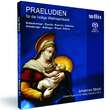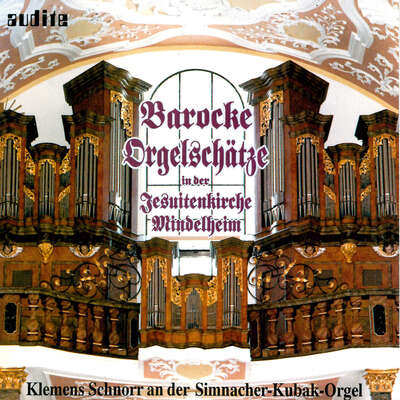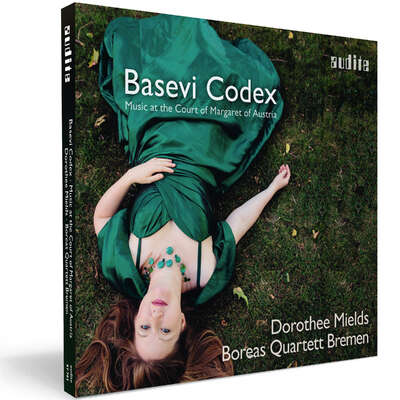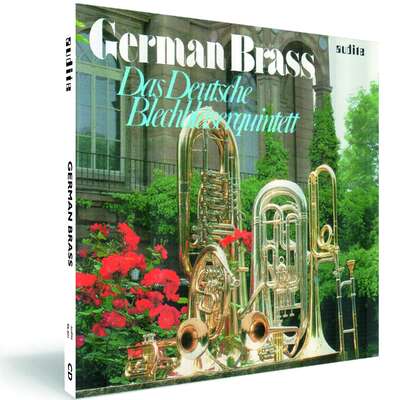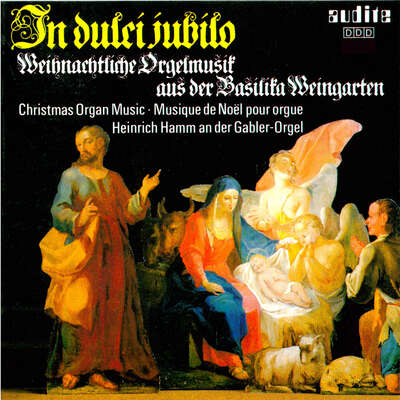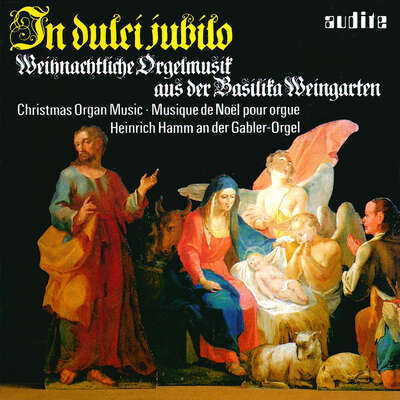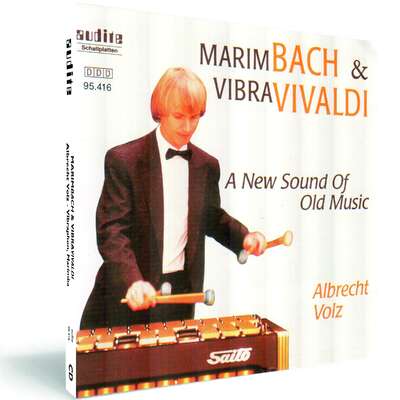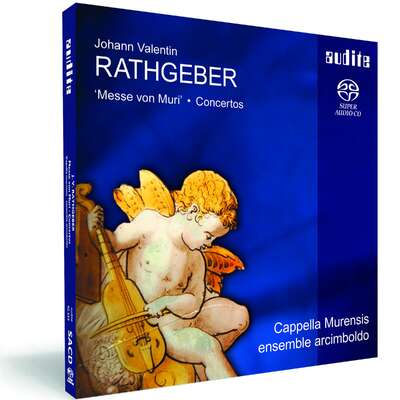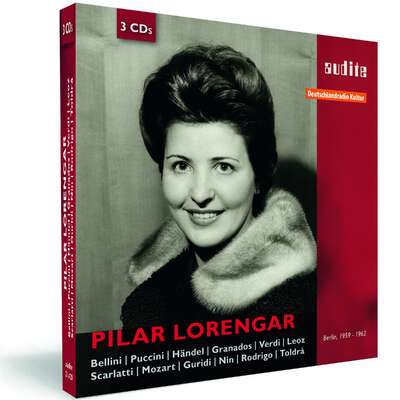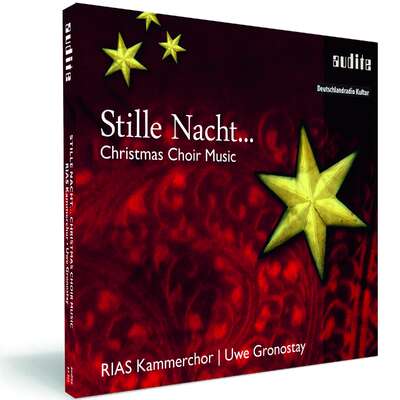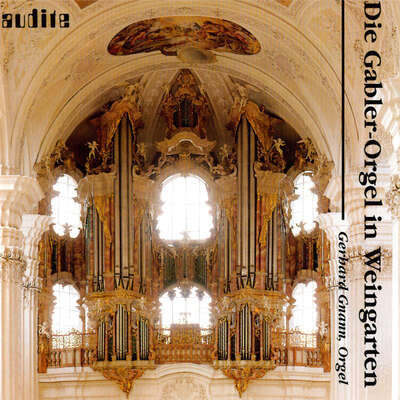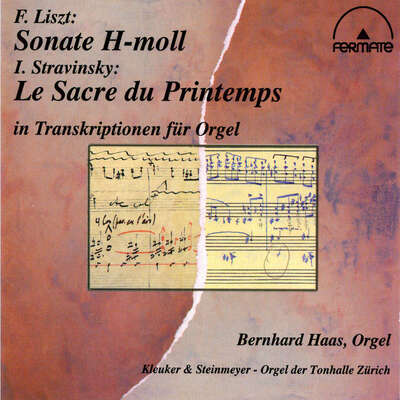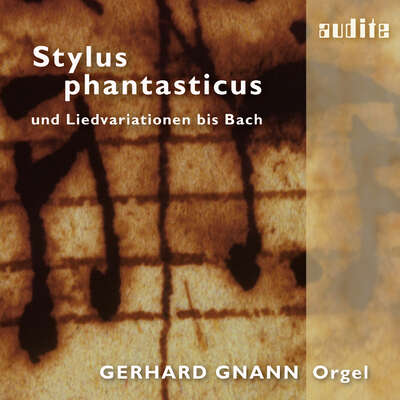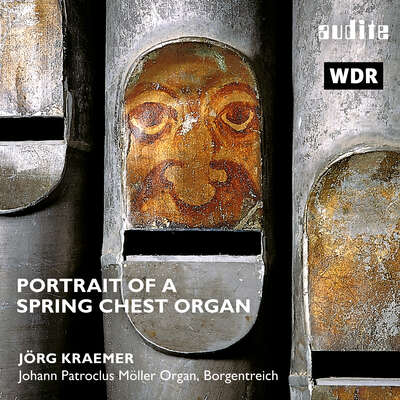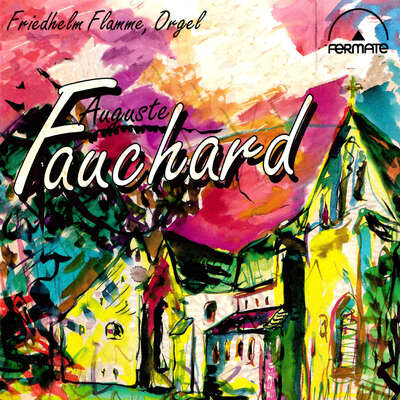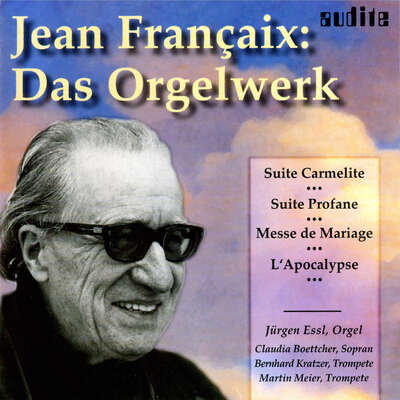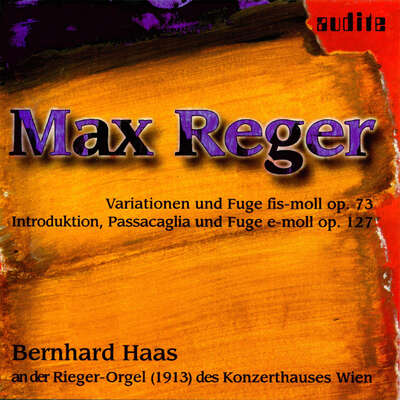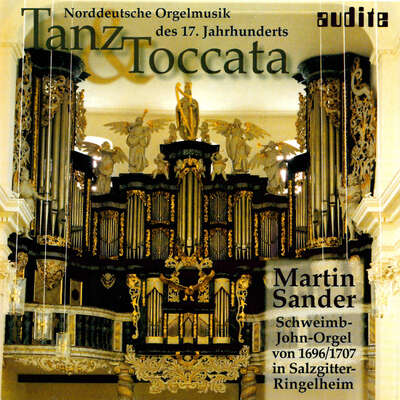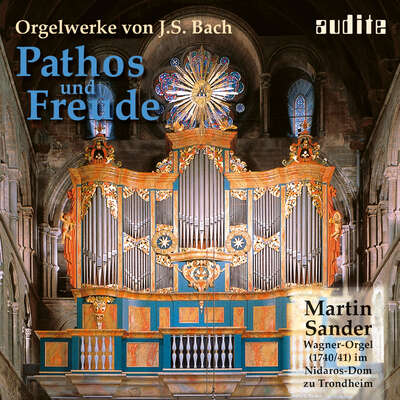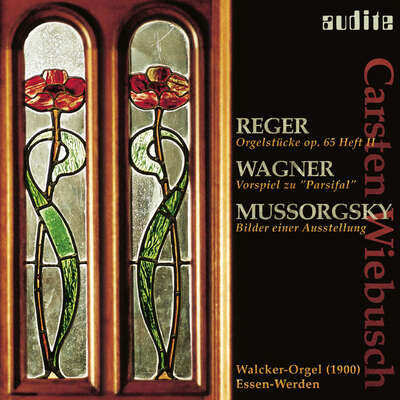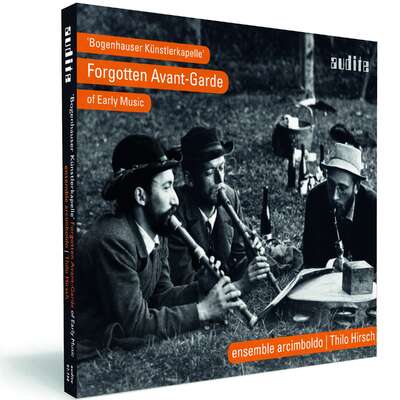
This SACD presents a selection of both vibrant and meditative organ music for Christmas , stretching from small and modest miniatures to more formal, classical compositions. Apart from their festive-pastoral character, the works on this disc share the same period and region of origin: they were...more
"Well, Audite have done it again. This is a first-rate collection that sounds rich and warm. Strobl’s playing is immensely assured, full of bounce and insight. The sound - on both layers - is up to the usual standards of the house. The booklet puts the music into its historical context, gives thumbnails of the composers featured and even includes the registrations for each piece. As for the organ itself, it’s rather like one of those wines aged in oak, fruity but with a distinctive, woody flavour. The perfect complement to a festive feast, but it keeps well and can be drunk any time afterwards." (musicweb)
Track List
This bonus track is only available as a download!
Details
| Praeludien für die heilige Weihnachtszeit | |
| article number: | 92.573 |
|---|---|
| EAN barcode: | 4022143925732 |
| price group: | ACX |
| release date: | 30. October 2009 |
| total time: | 79 min. |
Bonus Material
Informationen
This SACD presents a selection of both vibrant and meditative organ music for Christmas, stretching from small and modest miniatures to more formal, classical compositions. Apart from their festive-pastoral character, the works on this disc share the same period and region of origin: they were written between the late eighteenth and early nineteenth centuries and stem from an area encompassing southern Germany, Austria, Bohemia and Croatia. All composers represented here are firmly rooted in the Catholic church music tradition of these regions.
The historical sound of the main organ of the Abbey Church of Muri renders these gems for the organ particularly rich in colour. The historical organ in this famous Abbey in the Swiss Canton of Aargau is an important musical monument, enjoying great international esteem, and is visited each year by experts and enthusiasts from all over the world.
Johannes Strobl has performed as a soloist and ensemble musician in many European countries and in Israel, Japan, the USA, Brazil and Argentina. In 1998 he was a prizewinner at the Paul Hofhaimer Competition in Innsbruck, and in 2000 together with “Les Cornets Noirs” – an ensemble specialized in 17th-century music – at the “concours musica antiqua” in Bruges. Johannes Strobl also appears with increasing frequency as conductor of Cappella Murensis, a professional vocal ensemble which found its home in the Abbey Church at Muri in 2002. He and his ensemble achieved outstanding success with the release of the rediscovered “Mass of Muri” by Johann Valentin Rathgeber (aud.92.559). Since 2001 Johannes Strobl has been organist at the Abbey Church at Muri. In addition to his ecclesiastical duties he is the artistic director of the concert series “Music in the Abbey Church at Muri”.
Reviews
www.musicweb-international.com | DECEMBER 7, 2023 | Dan Morgan | December 7, 2023 | source: https://musicweb...
One of the attractions of this Christmas collection is that the music is unfamiliar. I’ve certainly grown a little weary of the same old festiveMehr lesen
But the real star of that Franck collection is the Swiss-made Goll instrument, the purity and transparency of which must make it one of the loveliest modern organs in Europe. Here we have a Swiss instrument in Switzerland itself, the Grand Organ of Muri, in Canton Aargau. The organ was built by the Schweizerdeutsch Thomas Schott between 1619 and 1630, restored and reconstructed by Metzler Orgelbau (1966-1971) and updated by Orgelbau Kuhn in 2002. No doubt organ buffs will be interested in the photographs on audite’s website, which offer a fascinating insight into this instrument and the church in which it stands.
So much for the organ, what about the music? The Pastorale, a Christmas musical tradition that originated in Italy, migrated northwards in the 18th century, where it was taken up by composers and organists and played after Midnight Mass. The Pastorale Prelude, a 19th-century derivative, is also well represented here. The disc kicks off with a delightful Prelude in D, by Johann Baptist Schiedermayr. It’s highly mobile and joyful, the distinctive ‘woody’ sound of this organ very well captured indeed. The CD sound is clear and spacious, but the SACD layer goes one better by revealing the tiniest of details and adding a real sense of presence to the recording.
The three Pastorales by Johann Anton Kobrich, from his collection The Keyboard-Playing Shepherd, are rather more delicate. Just sample the one in A (tr. 2), where the organ’s reedy higher registers are exploited to the full. Strobl plays the stately Pastorale in D (tr. 3) with a real feeling for the music’s liquid rhythms. The Pastorale in G (tr. 4) is dominated by repeated cuckoo-like figures, admirably articulated and recorded. The two Sonatas and Pastorale that follow are taken from a monastic collection, transcribed around 1700. The first Sonata in C (tr. 5) has a simplicity and charm that is most appealing, but it’s the irrepressibly animated Pastorale in F (tr. 6) that had me reaching for the repeat button.
This is shaping up to be a most rewarding collection, not least because the music is refreshingly direct. Indeed, given the festive context it’s more like a tart, bracing sorbet than a heavy dollop of Christmas pud. The palate-cleansing continues with three pieces by Johann Ernst Eberlin; they are taken from his Twelve Pieces for Keyboard, co-authored by none other than Mozart’s father, Leopold. The first (tr. 7) is a veritable cascade of lovely melodies, albeit with a hint of Baroque severity about them, the second (tr. 8) sounding for all the world like a steam-driven fair organ, sans the wheeze and clank. The final piece, a cradle-song, has a crystalline loveliness that’s entirely appropriate to the season. Once again, playing and recording are beyond reproach.
Franz Xaver Schnizer, choral director of the Benedictine abbey of Ottobeuren, wrote this dignified, rather Bachian, Sonata in G in 1773. A carefully worked piece in three movements, it’s ideally suited to the Muri organ’s higher and middle registers. In the first we leave the security of the fireside for the deep frost of a December night, somewhat shocked by the icy air (tr. 11). But then we’re back indoors with the warming cadences of the second movement (tr. 12), the third a rousing, dance-like finale (tr. 13). The organ’s ‘woodiness’ – close to a honk at times – seems just right for this rustic celebration.
By contrast, Schiedermayr’s Prelude in A flat (tr. 14) has a free-flowing, rhapsodic quality perhaps more Romantic than anything we’ve heard thus far. I particularly liked those bright, clarion-like calls in the treble, so beautifully articulated. The three Father Grünberger pieces, from his Nine Pastorale Organ Pieces – Book I, are more traditional in form and content, the E flat Pastorale (tr. 16) light and frothy, the one in C (tr. 17) relaxed and carefree. Not at all what one might expect from an Augustinian monk, albeit one who had a somewhat varied and colourful life beyond the cloister.
Good programming is essential to the success of collections such as this, and Strobl has certainly chosen his music wisely. Even though these works are all from the so-called South German School, they are surprisingly varied and interesting. Indeed, Strobl invests them all with a freshness and spontaneity that is most impressive. More important, variety makes it so much easier to listen to this disc without the slightest hint of tedium – very rare in organ collections. The two Pastorale Preludes by the Bohemian organist and composer Karl Franz Pitsch (trs. 18-19) are a case in point, the first weighty and more sonorous, the second a big, broad conception that sounds splendid in Strobl’s capable hands. Surely a work that deserves to be better known, and one I’d be happy to revisit time and time again.
Despite the obvious Christmas origins of these Pastorales and preludes the unwary listener might be hard-pressed to identify them as festive pieces. That is certainly true of Johann Kaspar Aiblinger’s wonderfully discursive Pastorale in G (tr. 20), which has the rambling nature of a much later, more Romantic, organ tradition. It has some lovely, rippling tunes, but at more than six minutes it does come close to outstaying its welcome. The final selection brings us back to Christmas, with Prague-born Robert Führer’s Weihnachtsgabe, Op. 271. The six miniatures include a darkly lyrical Andante in G (tr. 21), a wistful Andantino in F (tr. 23) and a warmly affirmative Larghetto in G (tr. 26). Not the most colourful or imaginative music on this disc, perhaps, but solidly constructed and winningly played.
Well, audite have done it again. This is a first-rate collection that sounds rich and warm. Strobl’s playing is immensely assured, full of bounce and insight. The sound – on both layers – is up to the usual standards of the house. The booklet puts the music into its historical context, gives thumbnails of the composers featured and even includes the registrations for each piece. As for the organ itself, it’s rather like one of those wines aged in oak, fruity but with a distinctive, woody flavour. The perfect complement to a festive feast, but it keeps well and can be drunk any time afterwards.
Organ | 4/2010 | Axel Wilberg | October 1, 2010
Zu Weihnachten hat – ausnahmsweise – noch immer sakrale Musik, undMehr lesen
Audiophile Audition | January 31, 2010 | Peter Joelson | January 31, 2010
The organ at the Abbey Church of Muri makes another welcome appearance onMehr lesen
Frankfurter Allgemeine Zeitung | 23. Dezember 2009 | Christiane Tewinkel | December 23, 2009 Singe, wem Gesang gegeben
Natürlich muss heute Abend gesungen werden. Nichts bietet schönerenMehr lesen
ouverture Das Klassik-Blog | Mittwoch, 2. Dezember 2009 | reagenz | December 2, 2009
Wenn die Orgel Bordunbässe fröhlich dröhnen lässt, wenn die Melodien inMehr lesen
Das Opernglas | Dezember 2009 | Michael Lehnert | December 1, 2009
CD-Special
Hörtipps zum Fest
Wie in jedem Dezember stürzt auch 2009 wieder eine Flut an Weihnachts-CDsMehr lesen
Bayern 4 Klassik - CD-Tipp | 30. November 2009 | Matthias Keller | November 30, 2009
Kein kirchliches Hochfest wurzelt so sehr in volkstümlichem Ambiente wie Weihnachten. Insofern liefert dieses Fest seine „Folklore“ praktischMehr lesen
Bezeichnend sicher auch, dass solch tönende Behaglichkeit vor allem im süddeutsch-österreichischen Raum angesiedelt ist; geschaffen von Komponisten, die man heute gerne als „Kleinmeister“ bezeichnet, die sich aber zu Lebzeiten größter Beliebtheit erfreuten. Der aus Österreich stammende Organist Johannes Strobl, seit 2001 Stelleninhaber an der Klosterkirche Muri, legt hier eine weitere audiophile Kostbarkeit vor, die nicht nur ein rares Repertoire zu Gehör bringt sondern diese Musik in derzeit bestmöglicher Weise auf Tonträger bannt - in Mehrkanal-Wiedergabe ebenso ein Hörgenuss wie als Stereo-CD.
Glaube + Heimat - Mitteldeutsche Kirchenzeitung | Nr. 48 vom 29. November 2009 1. Advent | Michael Klein | November 29, 2009
Präludien: Weihnachtliche Orgelmusik entwickelte sich im katholischenMehr lesen
Der neue Merker | 29. Jahrgang - Nr. 47 | Michael Karrass | November 25, 2009
Die vorliegende Einspielung präsentiert eine Auswahl lebendiger undMehr lesen
www.musicweb-international.com | November 2009 | Dan Morgan | November 1, 2009
One of the attractions of this Christmas collection is that the music is unfamiliar. I’ve certainly grown a little weary of the same old festiveMehr lesen
But the real star of that Franck collection is the Swiss-made Goll instrument, the purity and transparency of which must make it one of the loveliest modern organs in Europe. Here we have a Swiss instrument in Switzerland itself, the Grand Organ of Muri, in Canton Aargau. The organ was built by the Schweizerdeutsch Thomas Schott between 1619 and 1630, restored and reconstructed by Metzler Orgelbau (1966-1971) and updated by Orgelbau Kuhn in 2002. No doubt organ buffs will be interested in the photographs on Audite’s website, which offer a fascinating insight into this instrument and the church in which it stands.
So much for the organ, what about the music? The Pastorale, a Christmas musical tradition that originated in Italy, migrated northwards in the 18th century, where it was taken up by composers and organists and played after Midnight Mass. The Pastorale Prelude, a 19th--century derivative, is also well represented here. The disc kicks off with a delightful Prelude in D, by Johann Baptist Schiedermayr. It’s highly mobile and joyful, the distinctive ‘woody’ sound of this organ very well captured indeed. The CD sound is clear and spacious, but the SACD layer goes one better by revealing the tiniest of details and adding a real sense of presence to the recording.
The three Pastorales by Johann Anton Kobrich, from his collection The Keyboard-Playing Shepherd, are rather more delicate. Just sample the one in A (tr. 2), where the organ’s reedy higher registers are exploited to the full. Strobl plays the stately Pastorale in D (tr. 3) with a real feeling for the music’s liquid rhythms. The Pastorale in G (tr. 4) is dominated by repeated cuckoo-like figures, admirably articulated and recorded. The two Sonatas and Pastorale that follow are taken from a monastic collection, transcribed around 1700. The first Sonata in C (tr. 5) has a simplicity and charm that is most appealing, but it’s the irrepressibly animated Pastorale in F (tr. 6) that had me reaching for the repeat button.
This is shaping up to be a most rewarding collection, not least because the music is refreshingly direct. Indeed, given the festive context it’s more like a tart, bracing sorbet than a heavy dollop of Christmas pud. The palate-cleansing continues with three pieces by Johann Ernst Eberlin; they are taken from his Twelve Pieces for Keyboard, co-authored by none other than Mozart’s father, Leopold. The first (tr. 7) is a veritable cascade of lovely melodies, albeit with a hint of Baroque severity about them, the second (tr. 8) sounding for all the world like a steam-driven fair organ, sans the wheeze and clank. The final piece, a cradle-song, has a crystalline loveliness that’s entirely appropriate to the season. Once again, playing and recording are beyond reproach.
Franz Xaver Schnizer, choral director of the Benedictine abbey of Ottobeuren, wrote this dignified, rather Bachian, Sonata in G in 1773. A carefully worked piece in three movements, it’s ideally suited to the Muri organ’s higher and middle registers. In the first we leave the security of the fireside for the deep frost of a December night, somewhat shocked by the icy air (tr. 11). But then we’re back indoors with the warming cadences of the second movement (tr. 12), the third a rousing, dance-like finale (tr. 13). The organ’s ‘woodiness’ - close to a honk at times - seems just right for this rustic celebration.
By contrast, Schiedermayr’s Prelude in A flat (tr. 14) has a free-flowing, rhapsodic quality perhaps more Romantic than anything we’ve heard thus far. I particularly liked those bright, clarion-like calls in the treble, so beautifully articulated. The three Father Grünberger pieces, from his Nine Pastorale Organ Pieces - Book I, are more traditional in form and content, the E flat Pastorale (tr. 16) light and frothy, the one in C (tr. 17) relaxed and carefree. Not at all what one might expect from an Augustinian monk, albeit one who had a somewhat varied and colourful life beyond the cloister.
Good programming is essential to the success of collections such as this, and Strobl has certainly chosen his music wisely. Even though these works are all from the so-called South German School, they are surprisingly varied and interesting. Indeed, Strobl invests them all with a freshness and spontaneity that is most impressive. More important, variety makes it so much easier to listen to this disc without the slightest hint of tedium - very rare in organ collections. The two Pastorale Preludes by the Bohemian organist and composer Karl Franz Pitsch (trs. 18-19) are a case in point, the first weighty and more sonorous, the second a big, broad conception that sounds splendid in Strobl’s capable hands. Surely a work that deserves to be better known, and one I’d be happy to revisit time and time again.
Despite the obvious Christmas origins of these Pastorales and preludes the unwary listener might be hard-pressed to identify them as festive pieces. That is certainly true of Johann Kaspar Aiblinger’s wonderfully discursive Pastorale in G (tr. 20), which has the rambling nature of a much later, more Romantic, organ tradition. It has some lovely, rippling tunes, but at more than six minutes it does come close to outstaying its welcome. The final selection brings us back to Christmas, with Prague-born Robert Führer’s Weihnachtsgabe, Op. 271. The six miniatures include a darkly lyrical Andante in G (tr. 21), a wistful Andantino in F (tr. 23) and a warmly affirmative Larghetto in G (tr. 26). Not the most colourful or imaginative music on this disc, perhaps, but solidly constructed and winningly played.
Well, Audite have done it again. This is a first-rate collection that sounds rich and warm. Strobl’s playing is immensely assured, full of bounce and insight. The sound - on both layers - is up to the usual standards of the house. The booklet puts the music into its historical context, gives thumbnails of the composers featured and even includes the registrations for each piece. As for the organ itself, it’s rather like one of those wines aged in oak, fruity but with a distinctive, woody flavour. The perfect complement to a festive feast, but it keeps well and can be drunk any time afterwards.
